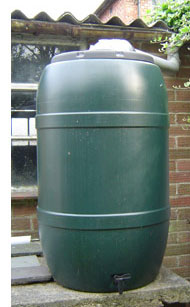Groundwater Basics
Tips on how you can help protect groundwater

David Macdonald, BGS © NERC 2004
a water butt collecting garage
roof runoff for watering a garden
You can help to protect the nation’s groundwater resources in a number of ways. For example, by conserving water. This will mean less groundwater needs to be pumped, ensuring resources are available for periods of drought and to help sustain ecosystems that rely on groundwater during summer months, such as rivers and wetlands. Also, by being careful how you dispose of chemicals at home. This will help avoid pollution of groundwater which can have a serious impact on the environment and on the cost of providing water to your house. Another way you can help avoid groundwater pollution is by ensuring that your heating oil tanks at home are regularly checked for leaks.
Here are some tips:
- Look at ways that you can conserve water around the house – don’t leave taps running, buy water efficient appliances and fix dripping taps.
-
Conserve water in the garden. Install a water butt to collect rainwater. Reduce water loss by applying a mulch to flower beds, and by watering plants in the evening when less evaporation occurs.
-
In many areas garden fertilizer and pesticides can get into groundwater. Always follow manufacturer’s instructions when using garden chemicals, and think about using natural alternatives for pest control.
-
Dispose of unwanted chemicals, used engine oil and similar materials at a properly licensed Public Amenity waste tip.
-
Inform the local office of your environment regulator if you are aware of any illegal polluting activities.
-
Ensure your home heating oil tanks meet the regulations.
-
Inform the local office of your environment regulator if you are aware of any illegal polluting activities.
-
Recycle! Recycling paper, plastics and metals can be good for groundwater, as recycling cuts the demand for water in industry.

Print this Page